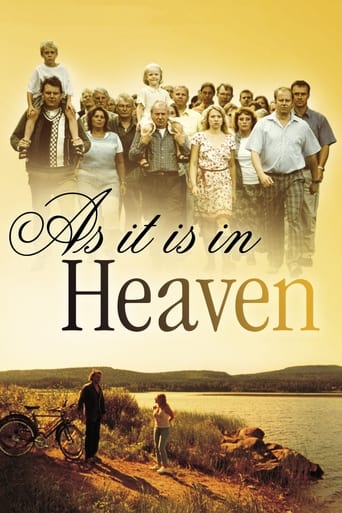

The second film about a man forming a chorus that was nominated for Best Foreign Language Film at the 2005 Academy Awards. I caught the other one, Les choristes, last week and didn't like it much. I liked this one even less. This Swedish film stars Michael Nyqvist as a famous conductor who is forced to retire due to health problems. He moves back to his small hometown, and signs up as the new church cantor. Unfortunately for him, there's a lot of behind the scenes, small town drama going on with everybody, and he gets caught up in the middle of it. There's a lot of ridiculous melodrama here, and a typical scene has a bunch of people in their little choir practice room shouting at each other for little reason. Really, the various plot lines of this movie probably could have worked, but the writing never develops any of the characters or situations enough for it ever to work. There are three major plot lines: 1) One of the choir members is being abused by her husband, and he tends to believe his wife is cheating on him with Nyqvist. 2) The local pastor (Niklas Falk), who seems at times like he walked straight out of Bergman's Fanny and Alexander, is a stern priest who feels the choir members (including his wife) are having too much fun, and he's jealous that Nyqvist is more popular in town than he is. And 3), there's a love story between Nyqvist and the town tramp (Frida Hallgren). It's ridiculously innocent, but the more religious townspeople blow it out of proportion. Kudos to Nyqvist for a decent performance, giving his underwritten character much more personality than was apparently on the page. I also liked Hallgren, who also doesn't have any character to speak of but does have a nice, likable presence.
... View MoreWhile this film provides a mildly interesting view of life in northern Sweden, there are plot holes you could drive a truck through. In particular, character motivation is incomprehensible. Why does this world famous musician retire to his childhood home which he hated? This is never really explained, and it is an important point. He could go anywhere in the world he chooses, so why go to this cold Swedish hell? Not explained. Why does he agree to direct a choir when all he wants to do is "listen?" Again, no convincing explanation. What the heck is physically wrong with him? We are told "heart problems" yet we see him smeared with blood on several occasions (looks more like TB than heart problems) and there appears to be no attempt at medical treatment or self-care. He seems to have no idea of his own physical limitations or to take the most basic steps towards remaining alive. So is he suicidal or what? Again, there is a large plot element focused on domestic violence, but the police are not called in until very late, and there is no real reason why not. Etc. etc. The film makes some lame attempt to answer these and other questions, but the result is unconvincing and unsatisfying. Thumbs down, an insult to viewers' intelligence.
... View MoreThis movie is a disappointment. A nice premise falls flat when the lead character proves himself to be an idealistic wimp. Some of the supporting characters are well played, notably the two major female figures, Frida Hallgren and Helen Sjöholm as Lena and Gabriella. In typical fashion for a post-1960s film, the church is portrayed as corrupt and hypocritical, causing me to wonder anew whether there are any screenwriters or directors out there with a spiritual backbone. The so-called climax of the movie is laughably unconvincing, when an entire audience is won over by a motley choir voicing nonsense syllables on stage. (This ranks right down there with the ridiculous town hall meeting in "Field of Dreams" for shallow audience manipulation.) Don't bother with this promising flop. It does not deliver.
... View MoreThis review only contains spoilers in the sense of offering an interpretation of the film. You must work hard to make my summary fit the plot of the film. The charismatic stranger who comes to a tiny, isolated town in Northern Sweden where he had been bullied as a child is a burnt out orchestral conductor. In this nameless town, the Church is so corrupt and out of touch as to be utterly lawless. Daniel succeeds in getting the small church choir there to sing the music of heaven, but at the same time destroys all the useful hierarchies. More importantly perhaps, he falls in love. The title, which comes from the Lord's Prayer, is only the first indication that the film is held together with strong Christian symbolism. Like Christ, Daniel is surrounded by good and bad women and betrayed by one of his disciples. Like Christ, he dies once to meet his maker and rise again as his believers convert all who listen to them.Despite its religo-didactic character, As it is in Heaven is a well made film with psychologically believable characters, sensitive acting and photography, and an apt representation of what it is like to learn how to make and perform vocal music. The marital close-ups will remind you of Portraits of a Marriage.
... View More